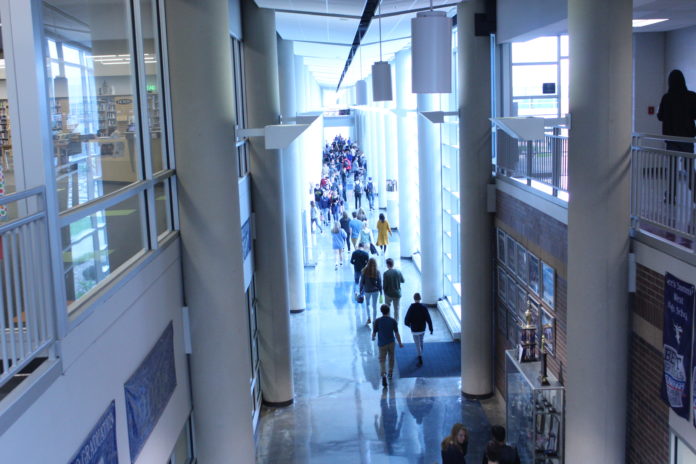Abby White
War. A word commonly associated with battlefields and weapons of mass destruction. A word that also applies to substance abuse. The War on Drugs is not a fight fought with things like bombs or mustard gas, but is a social and political war being fought in our community, as well as most of the world.
The War on Drugs is what many call the government initiative to fight drug use and distribution under president Nixon put in place during the 1970’s, however the history of the US war on drugs goes back as far as 1914 with the Harrison Narcotics Act restricting the distribution of certain drugs.
“The national campaign of “the war on drugs” began when I was a kid and I remember the commercials and educational campaigns that were started,” Lee’s Summit West Resource Officer Bobby Conard said.
Now, however, with drug laws relaxing a bit and some states legalizing marijuana, the war on drugs is less of a national political battle as it is community one.
“While most everyone would agree that lesser drug use in our society is desirable, the laws and policies that have been implemented have not had that effect,” history teacher Matt Turner said. Turner teaches a class only available this year called The Five Wars of Globalization. In this class there is a unit focusing on the War on Drugs. “Drug use is still rampant and the United States currently has more people in it’s prisons than any other nation on Earth. Most prisoners are there for nonviolent crimes, many of which are drug related.”
Combatting drugs is not easy according to Mendy Edwards, the advisor for Titan Smart. “I think it is a very difficult war to fight,” said Edwards, “No one chooses to be an addict. Every teen uses thinking that they can handle it. Some are lucky enough to be able to use socially, but some are not and end up battling the addiction for life.”
According to drugabuse.gov there were about 7,800 new drug users per day in 2013. Over half of those were teenagers under 18.
“The teen brain is a work in progress. Our brains aren’t fully developed until our mid-20s, so teens are guided more by their emotions than logic.When teens are stressed, they may make poor decisions if they can’t picture the consequences of today’s decisions,” said Monica Meeks a representative for Lee’s Summit Cares.
Turner said students will encounter drugs relatively young. He feels that by educating about the dangers of drug use people will “think twice before walking down that road.
Conard also feels that knowledge of the consequences can help prevent substance abuse.
“I have three kids, 15, 12, and 10. I have had discussions with all of them about drugs, alcohol, and tobacco. We have talked about the law, the consequences and health issues as well,” Conard said.
“I think strong parental involvement is critical in preventing teens from using. I also feel that if a friend is pressuring you into using to trying something that you do not wish to do, I am not sure I would consider them a friend,” Conard said.
The fact that teens will have some form of an encounter with drugs is commonly accepted. Meeks works with teens to help determine what “stressors teens feel so we can understand why teens use alcohol and drugs to cope,” said Meeks. “If we can get to the real reason why youth use these substances, we can look at community strategies to better support our young people.”
There are many reasons why a person would turn to illicit drugs. Edwards works with high school students through Titan Smart and has one perspective as to why teens use drugs.
“I think Teens use it as an escape, either from pressures to get perfect grades, be the top athlete, etc or to escape negative circumstances,” Edwards said. “I think that teens have to make a deliberate and conscious decision to avoid drugs and alcohol and surround themselves with friends that have the same standards. Once you put yourself in a situation where there is pressure, it becomes a lot harder to resist.”
Drug use has many negative affects that teenagers do not always think about before using illegal substances.
“It changes people’s lives. They lose family, friends, get into legal trouble, suffer negative medical effects, amongst numerous other issues,” Conard said.
Substance abuse can also affect those around you, or you can be affected by others drug or alcohol abuse.
“Alarmingly, 19% of local students have ridden with someone under the influence of alcohol or drugs in the last month. The majority of teens know not to drink and drive, but they don’t recognize the danger of getting into a car with someone who is under the influence,” Meeks said.
Turner feels that by knowing how drugs affect people and how people have tried to prevent drug use in the past we can work towards ending substance abuse.
“If we truly want to lower the amount of people be exposed to and dying from harmful drugs, the first step is educating ourselves on what has worked in the past and what has not,” Turner said, “The worst thing we can do is to look at a problem that has just gotten worse with time and apply the same policies and lessons to it they were attempting to do 40 years ago. Change begins with education.”
Conard said, “Our school community os a good representation of the community as a whole. Our community suffers from drug-related issues as do some of our students. Sometimes those issues find their way onto school property and have to be dealt with accordingly.”














